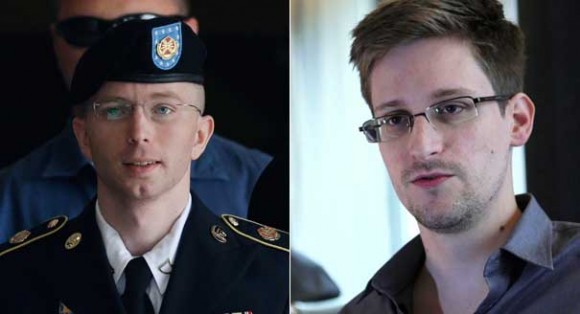
By John Glaser
Writing in Foreign Affairs, two George Washington University professors note the strange inability of “the U.S. establishment” to substantiate their claims that leakers like Edward Snowden and Chelsea Manning pose an enormous threat to national security.
The reason the establishment hasn’t been able to back that up is because there is a “deeper threat that leakers such as Manning and Snowden pose [that] is more subtle than a direct assault on U.S. national security: they undermine Washington’s ability to act hypocritically and get away with it.”
The inability to get away with our own hypocrisy and double standards presents a dire threat to U.S. hegemony, write Henry Farrell and Martha Finnemore:
Hypocrisy is central to Washington’s soft power — its ability to get other countries to accept the legitimacy of its actions — yet few Americans appreciate its role. Liberals tend to believe that other countries cooperate with the United States because American ideals are attractive and the U.S.-led international system is fair. Realists may be more cynical, yet if they think about Washington’s hypocrisy at all, they consider it irrelevant. For them, it is Washington’s cold, hard power, not its ideals, that encourages other countries to partner with the United States.…This system needs the lubricating oil of hypocrisy to keep its gears turning. To ensure that the world order continues to be seen as legitimate, U.S. officials must regularly promote and claim fealty to its core liberal principles; the United States cannot impose its hegemony through force alone. But as the recent leaks have shown, Washington is also unable to consistently abide by the values that it trumpets. This disconnect creates the risk that other states might decide that the U.S.-led order is fundamentally illegitimate.Of course, the United States has gotten away with hypocrisy for some time now. It has long preached the virtues of nuclear nonproliferation, for example, and has coerced some states into abandoning their atomic ambitions. At the same time, it tacitly accepted Israel’s nuclearization and, in 2004, signed a formal deal affirming India’s right to civilian nuclear energy despite its having flouted the Nuclear Nonproliferation Treaty by acquiring nuclear weapons. In a similar vein, Washington talks a good game on democracy, yet it stood by as the Egyptian military overthrew an elected government in July, refusing to call a coup a coup. Then there’s the “war on terror”: Washington pushes foreign governments hard on human rights but claims sweeping exceptions for its own behavior when it feels its safety is threatened.The reason the United States has until now suffered few consequences for such hypocrisy is that other states have a strong interest in turning a blind eye. Given how much they benefit from the global public goods Washington provides, they have little interest in calling the hegemon on its bad behavior. Public criticism risks pushing the U.S. government toward self-interested positions that would undermine the larger world order. Moreover, the United States can punish those who point out the inconsistency in its actions by downgrading trade relations or through other forms of direct retaliation. Allies thus usually air their concerns in private. Adversaries may point fingers, but few can convincingly occupy the moral high ground. Complaints by China and Russia hardly inspire admiration for their purer policies.The ease with which the United States has been able to act inconsistently has bred complacency among its leaders. Since few countries ever point out the nakedness of U.S. hypocrisy, and since those that do can usually be ignored, American politicians have become desensitized to their country’s double standards. But thanks to Manning and Snowden, such double standards are getting harder and harder to ignore.
So, while not even the most vicious government agent has been able to substantiate any claims of an actual threat to Americans’ safety resulting from the Manning and Snowden disclosures, it is certainly true that their leaks have weakened Washington’s ability to act in ways that are contrary to self-serving propaganda about freedom, democracy, and the rule of law.
And that is the kind of threat that power hates the most.




No comments:
Post a Comment